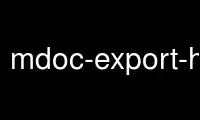
This is the command mdoc-export-html that can be run in the OnWorks free hosting provider using one of our multiple free online workstations such as Ubuntu Online, Fedora Online, Windows online emulator or MAC OS online emulator
PROGRAM:
NAME
mdoc export-html - Convert mdoc(5) XML to HTML.
SYNOPSIS
mdoc export-html [OPTION]* DIRECTORIES
DESCRIPTION
mdoc export-html creates HTML files from the mdoc(5)-formatted documentation XML files
within DIRECTORIES.
OPTIONS
--default-template
Writes the default XSLT used to stdout.
--ext=EXTENSION
The file extension to use for created files.
This defaults to html.
--force-update
Always generate new files. If not specified, will only generate a new output file
if the source documentation file is newer than the target output file.
-o, --out=DIRECTORY
Write the created files within directory DIRECTORY.
--template=FILE
An XSLT file to use to generate the created files.
If not specified, uses the template produced by --dump-template.
See the TEMPLATE FORMAT section below for more information.
--with-profile=PROFILE
Only process types and members within the .NET profile PROFILE. May be specified
multiple times. If not specified, all types and members, regardless of version,
are processed.
Valid profiles are:
monotouch
net_1_0
net_1_1
net_2_0
net_3_0
net_3_5
net_4_0
silverlight
--with-version=VERSION
Only process types and members within the assembly version VERSION. May be
specified multiple times. If not specified, all types and members, regardless of
version, are processed.
VERSION is an assembly version, e.g. 2.0.5.0.
-h, -?, --help
Display a help message and exit.
TEMPLATE FORMAT
The template file is an XSLT which needs to process the following input XML document:
<Page>
<CollectionTitle>Collection Title</CollectionTitle>
<PageTitle>Page Title</PageTitle>
<Summary>Page Summary</Summary>
<Signature>Type Declaration</Signature>
<Remarks>Type Remarks</Remarks>
<Members>Type Members</Members>
<Copyright>Documentation Copyright</Copyright>
</Page>
The generated HTML also makes use of several CSS classes. You can either use the create-
default-style named template found within the --default-template output to generate these
classes, or explicitly define the following CSS classes:
.CollectionTitle
.PageTitle
.Summary
.Signature
.Remarks
.Members
.Copyright
.Section
.SectionBox
.NamespaceName
.NamespaceSummary
.MemberName
.MemberSignature
.MemberBox
.Subsection
.SubsectionBox
.SignatureTable
.EnumerationsTable
.CodeExampleTable
.MembersListing
.TypesListing
.InnerSignatureTable
.TypePermissionsTable
HTML LINKS
All members within the HTML file have an id attribute to permit linking to a specific
member. The value of the id attribute is the String ID of the specified member.
See the CREF FORMAT section of mdoc(5) for more information.
MAILING LISTS
Visit http://lists.ximian.com/mailman/listinfo/mono-docs-list for details.
WEB SITE
Visit http://www.mono-project.com/docs/tools+libraries/tools/mdoc/ for details
mdoc-export-html(1)
Use mdoc-export-html online using onworks.net services
